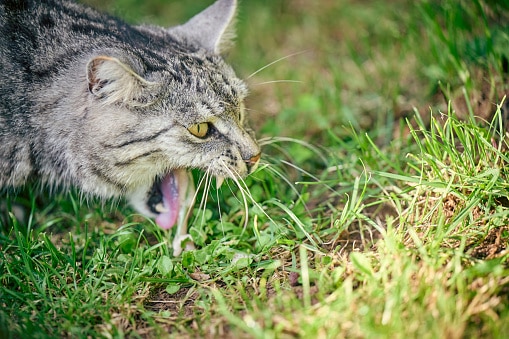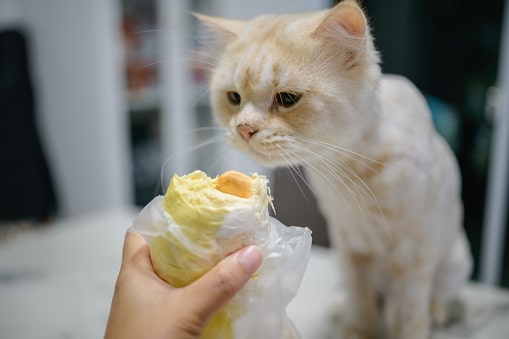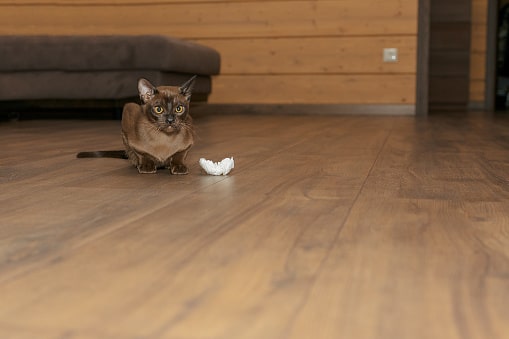If your cat has eaten a rubber band, there are good chances of it passing through their body from causing little harm to no discomfort at all, if you’re lucky. But on the other hand, there are various risks related to your ingesting a rubber band or any other foreign object. It is best to immediately call your vet and keep them aware of the situation in times like these.
In this article, you will learn everything from what you should do if your cat ate a rubber band to what could happen if your cat ate a rubber band. All your questions will have an answer in the next ten minutes.
Why do Cats Like Rubber Bands?
Cats like rubber bands for a number of reasons, read on to find out about each one.
Texture
Cats may associate the feeling of playing with a rubber band with the feeling when they rip out tendons from the prey they catch. It may cause them to become aggressive since they are “hunting”. They love to play with it because of its chewy and rubbery texture.
Smell
In comparison to humans, cats have an amazing sense of smell and are able to detect scents 10-20 times more effectively. Cats may also enjoy playing with rubber bands because of the smell they emit. A cat may become overly excited by rubber chemicals that mimic pheromones.
Hoarding
There is no doubt that cats are notorious hoarders who store a variety of items in their homes. As opportunistic creatures, cats hunt prey regardless of whether or not they are hungry. In some cases, hoarding senses are rooted in the habit of bringing prey back to the den or collecting valuable materials for nests.
Stress
Stress can affect cats as well, and their anxiety may lead to constant chewing on rubber bands. Anxiety in cats can be triggered by stress, unruly children, illness, or even another cat in your household. Your cat may be trying to soothe itself by chewing on rubber bands or other objects.
Nutritional Deficiency
It is an alarming problem if your cat intends to rip apart a rubber band and digests it. There is a possibility that the cat is seeking a specific nutrient that isn’t available to them in their diet. Veterinarians can easily treat diet deficiencies when they diagnose cats.
Pica
It is possible that your cat has a form of Pica if a nutritional deficiency is not to blame. Pica is the habit of eating inedible items, such as plastics, fabrics, rubber, or paper. Several factors may contribute to Pica, including being weaned too early or a compulsive disorder.
What Should You Do if Your Cat Ate a Rubber Band?
Cats in the wild are pretty much used to hunting their prey and eating the innermost parts of their prey, in short, their entrails. We also know that cats are very fond of things like strings, rubber bands, hair ties, etc. The scientific reason behind this has yet to be given out but knowing the fact that a string twitches like a mouse tail, a lizard, or any other small prey that triggers the cat’s predatory instincts gives us the answer.
A basic string, a hair tie, or even a rubber band can play the role of being something similar to entrails that your cat can find at home.
What if your Cat hasn’t Swallowed the Rubber Band?
If it’s not too late yet if you see your cat playing with the rubber band or chewing on it the first thing you should do is check their mouth to see if the rubber band is still there. There are good chances of the rubber band still being there.
Cats are playful creatures. They like it to play with their prey first and then prey on them. Similarly, if your cat is still playing with the rubber band and has not swallowed it yet you have the chance to intervene and pull it out.
What if the Rubber Band is Stuck in Your Cat’s Mouth?
When it comes to an elastic string like a rubber band the band may tend to get stuck around your cat’s tongue or somewhere in its mouth. At times, it may be easy to take the rubber band out without harming your cat. That’s the time you can try to remove it yourself.
But unfortunately, there are times when a little bit of pulling or forcing at anything will be needed. That’s when you should know you don’t have to do anything yourself. Just call up your veterinarian and allow them to deal with the problem. Your veterinarian is a professional who knows how to do their job the best, trust them.
What if the Rubber Band is Stuck in your Cat’s Stomach?
After your cat swallows the rubber band there’s not much you can do manually as a pet parent to help your little cat. You just need to wait for your cat to expel the rubber band on its own. Your cat may either cough it out or puke out the rubber band on its own if you’re lucky. But this does not happen in all cases, so do not expect too much at once.
You need to make sure to check the litter box in the first 24 hours after every use since ingestion to see if your cat has expelled the rubber band. The rubber band can pass through your cat’s gastrointestinal tract without causing any damage, so keep checking the litter box.
Whether or not your cat has expelled the rubber band and he or she shows any signs of discomfort or any type of abnormal behavior contact your vet instantly. It is important to avoid the situation from getting any worse further.
Symptoms When Your Cat Eats a Rubber Band
If you happen to notice one or more of the symptoms mentioned below, contact your veterinarian. The symptoms are:
Vomiting

Vomiting is the first and best sign that screams gastrointestinal problems. By vomiting your cat is trying its best to get rid of the rubber band or any object stuck in its intestines or stomach.
If the vomit turns out to be dark brown then it’s worrisome since the dark brown colour means there is blood or faeces mixed in it. This is a sign of internal bleeding in the intestines.
Abdominal Pain
This will be tough for you to identify manually since cats don’t really like being touched on their bellies. But this does not mean you won’t know if your cat is going through abdominal pain. Most animals tend to walk in a crooked manner or lie in very strange positions while they are facing abdominal pain.
Diarrhea
Your pet having loose stools is not a bad sign every time when it comes to talking about toxic or dangerous ingestions. You need to keep an eye on the litter box constantly to see if your cat managed to push the rubber band out of their systems on their own.
Diarrhea can cause dehydration if it becomes a recurring symptom. This means your cat might be having bigger problems in its intestines.
Loss of appetite

The moment your cat loses interest in eating food you should think there is something wrong since they are good eaters. If your cat has eaten a rubber band and is showing signs of not wanting to eat food it’s maybe because there is some type of discomfort they are feeling which is stopping them from eating.
Unusual Behaviour

This symptom may vary from cat to cat. If your cat is going through pain then it might express it through growling or biting. If your cat reacts aggressively to everyday cuddles then it’s time you know there is something wrong with your cat.
Lethargy
As a cat parent, you know how active or energetic your cat is on a daily basis so if you notice any slight changes in the energy of your cat consider it happening due to an infection or another issue going on in the body of your cat. If your cat tends to avoid its playtime, assume that they are showing signs of being lethargic.
What Could Happen if Your Cat Swallowed a Rubber Band?
The two biggest risks you should be worried about after your cat swallows a rubber band are intussusception and necrosis. The main concern related to ingestion is what happens when the object reaches your cat’s intestines.
Intussusception
Intussusception occurs when a part of the intestines telescopes inside another which then causes a blockage.
This is very dangerous since the intestines can easily rub against each other which may lead to tearing and opening up wounds inside the body of your cat.
Bacteria and toxins will flow into the bloodstream of your cat causing them various dangerous infections.
Necrosis
Not only will the rubber band that is stuck around the intestines cause a clog but it will also make it nearly impossible for your cat to ingest any other more food. It will prevent blood from flowing correctly too.
In cases like these, even surgery might be too late.
Conclusion
Cats should be around only safe toys which are designed to meet their needs. The objects that you know your cat will find fascinating enough to chew on or play with and might also cause them harm should be kept away from them at all times.
Your pet cat cannot eat rubber bands. Especially, never again. Even though there are chances of the rubber band passing through your cat’s body without causing them harm, the risks are way too many. That’s why reacting and taking prevention in time are the best options to save the life of your cat.
